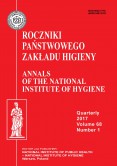Rocz Panstw Zakl Hig 2016, 67(4): 427-433
Evaluation of communication and acceptance of the patients by medical personnel.
[Evaluation of communication and acceptance of the patients by medical personnel.]
ABSTRACT
Background. The low level of patient satisfaction recorded in many studies and, at the same time, the level of frustration and burnout, disclosed by medics in the perception of the patient as a ‘problem’, incline to look for the causes of inadequate relationship between physician and patient.
Objective. The aim of this study was to evaluate the level of acceptance of the patient by the medical personnel. The research problem was the acceptance level which was within the range of the communication skills of the nurses and doctors. Another aim was to discover the factors determining this level of acceptance.
Material and Methods. Two methods were used in the research process: 1) a diagnostic survey regarding the medical, professional communication skills; 2) testing of professional self-esteem from the medical aspect. The study population consisted of a total of 1,244 respondents divided into the following groups: registered nurses and doctors (729), students of nursing and medical faculties (515).
Results. The results of the research showed that in most cases the acceptance of the patient by the medical staff was ‘conditional’, which translated into the level of frustration or lack of satisfaction with their profession, and ultimately into the level of burnout. The level of patient acceptance by medical staff (unconditional acceptance), depended primarily on age, followed by their profession. However, the relationship between this acceptance and gender and work experience was statistically insignificant.
Conclusions. As the method to improve this situation, the expansion of education in the field of interpersonal communication is proposed, adding issues related with both the conditional and unconditional acceptance of the patient, as well as issues regarding how to deal with the patient from the aspect of disease and the psycho-socio-spiritual area.
STRESZCZENIE
Wprowadzenie. Niski poziom satysfakcji pacjenta odnotowany w wielu badaniach naukowych, jak również frustracja oraz wypalenie zawodowe wśród personelu medycznego skłania do poszukiwania przyczyn tych problemów w nieprawidłowej relacji pomiędzy pacjentem a lekarzem.
Cel. Celem badań była ocena poziomu akceptacji pacjenta przez personel medyczny. Badaniem objęto poziom akceptacji, który mieścił się w zakresie umiejętności komunikacyjnych pielęgniarek i lekarzy. Celem wtórnym było odkrycie czynników determinujących ten poziom akceptacji.
Materiał i metoda. W procesie badań naukowych zostały wykorzystane dwie metody: 1) badanie diagnostyczne dotyczące medycznych, zawodowych umiejętności komunikacyjnych; 2) badanie samooceny zawodowej z punktu widzenia medycznego. Badana populacja składała się z 1244 respondentów podzielonych na grupy: pielęgniarki i lekarze (729), studenci pielęgniarstwa oraz nauk o zdrowiu (515).
Wyniki. Wyniki badań wykazały, że w większości przypadków akceptacja pacjenta przez personel medyczny jest „warunkowa”, co przełożyło się na poziom frustracji i brak satysfakcji z wykonywanego zawodu, a ostatecznie na poziom wypalenia zawodowego. Natomiast bezwarunkowa akceptacja pacjenta przez personel medyczny zależała przede wszystkim od wieku, a następnie zawodu pacjenta. Związek między akceptacją a płcią i doświadczeniem zawodowym był statystycznie nieistotny.
Wnioski. W celu poprawy relacji interpersonalnych na linii pacjent – personel medyczny w zakresie edukacji z komunikacji interpersonalnej proponuje się dodanie do edukacji zawodowej zagadnień związanych zarówno z warunkową jak i bezwarunkowa akceptacją chorego, jak również zmianę dotyczącą sposobu postępowania z pacjentem począwszy od aspektu chorobowego aż do obszaru psycho-społeczno-duchowego.
Liczba pobrań: 1988


